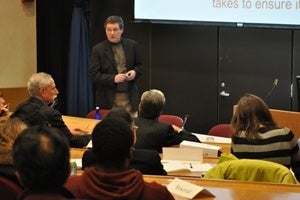January 26, 2012 — Whether drafting a plan to help patients make healthier food choices or designing an electronic medical records system, the more public health professionals know about the personal preferences of those who will use the end product, the more likely the initiative will be successful, Patrick Whitney (pictured at right), told an overflow HSPH audience January 17, 2012 in Kresge G2.
Called a “design visionary” by Business Week, Whitney is Dean of the Institute of Design, Illinois Institute of Technology. He has published and lectured throughout the world on making technological innovations more humane, linking design and business strategy, and designing interactive communications and products. “People have varied aspirations and activities. Your offering has to fit their lives,” Whitney said in his talk, “Designing Healthy Lives and Other Wicked Problems.”
View a webcast of the lecture.
In his introduction, Dean Julio Frenk said he invited Whitney to deliver the first talk in the 2012 Dean’s Distinguished Lecture Series to encourage listeners to “think outside the conventional boundaries of public health.” While at HSPH Whitney also addressed students in a new course on innovations in public health taught by Gerald Chan, SM ’75, ScD ’79.
When designing a product, tool, policy, or program today, public health professionals are likely to face many “wicked problems,” Whitney said. “Wicked problems are characterized by having to make decisions when you don’t have enough information, and the information you do have is changing faster than you can make a decision,” he said. This often means “it is better to be approximately right than precisely wrong.”
In addition, he noted, consumers are no longer satisfied with “ordinary” designs; they want extraordinary products and services. They also want more choices, which can add complexity and decrease profits.
Whitney gave the example of how his team designed a tool to help patients recovering from heart disease make healthier food choices. “If you go home with patients, look in their refrigerator, and watch them cook and shop, there’s a complete conflict between what doctors ask them to do and how the family lives; how the family lives probably caused the heart disease problem,” Whitney said. So his team developed a fun, interactive, web-based cookbook that tracks how well the patient is doing with their food selections, links to a food delivery service, and conveys what the patient eats directly to the doctor. “This is so good that people without heart problems want to use it,” Whitney said.
“The task of design is to take things that are mundane, bad, or unpleasant and couch them into the activity that people care about. As they achieve what they care about, they happen to achieve the regimen that you want,” Whitney said.
Walter Willett, chair of the Department of Nutrition and Frederick John Stare professor of nutrition and epidemiology at HSPH, spoke about the important role design plays in lifestyle and health. As an example, he said incorporating bicycle tracks in urban environments can help promote physical activity, but tracks in Boston and many other U.S. cities tend not to be as attractive or safe as those in Europe where much more consideration has been given to using bicycles for main transportation.
Willett said more thought needs to be given to the role of design in nutrition. “The food industry has been putting a large amount of effort into designing and marketing products and features that appeal to consumers. Our environment is very carefully designed so that there is something [food] within reach almost everywhere we go, in drive-throughs and vending machines, at the right level and color,” he said.
To counter those efforts and promote better nutrition, Willett suggested that the HSPH cafeteria might offer packages of washed, cut up vegetables and other fresh ingredients for, say, a stew, that faculty, staff, and students could purchase for their evening meal. “There are lots of opportunities for making our physical and food environments much better,” Willett said.
–Marge Dwyer
